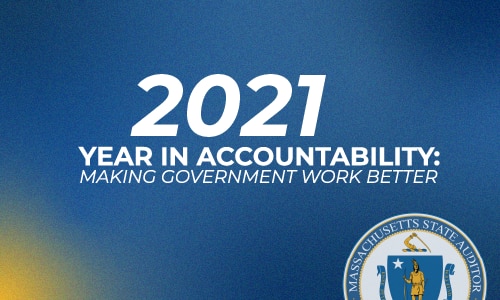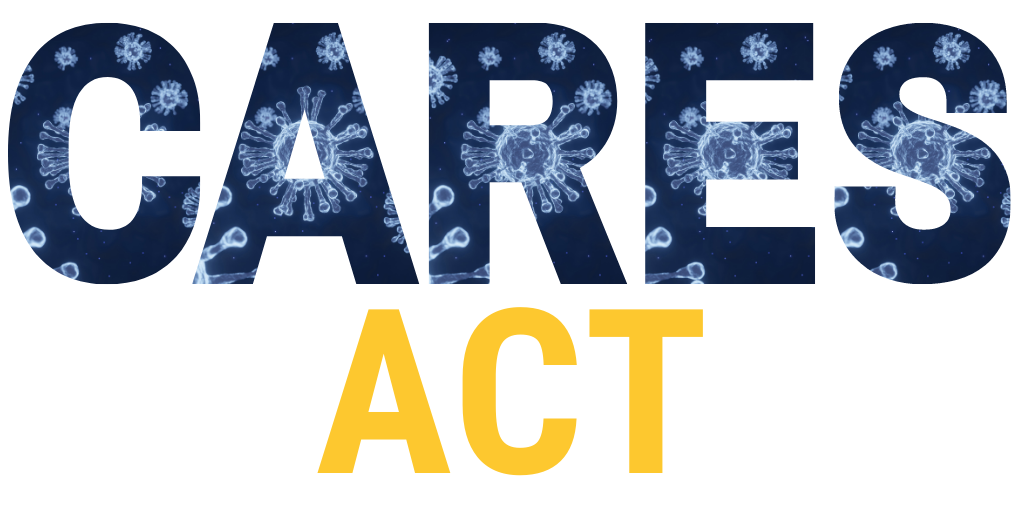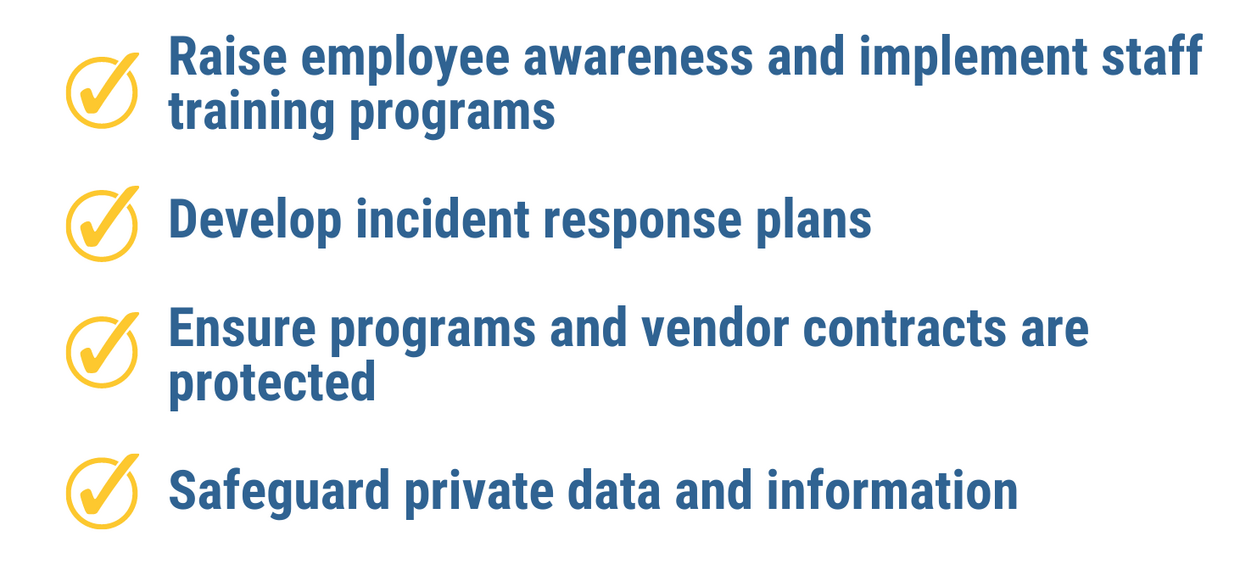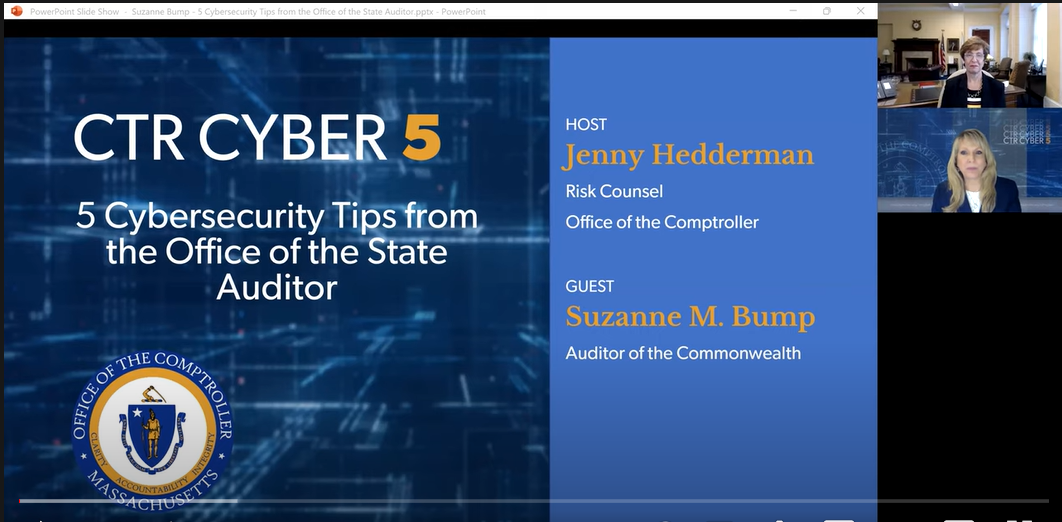A National Leader in Accountability
The Office of State Auditor Suzanne M. Bump (OSA) prides itself on being a leader on the regional and national stage in terms of government accountability. Over the past year, all audit staff have earned continuing education credits in accordance with Government Auditing Standards, and a few individuals and teams at OSA received three distinguished awards showcasing the excellent work and significant impact of our audits and reports.
The first award was presented to First Deputy Auditor Meredith Barrieau from the Association of Government Accountants during the AGA’s National Leadership Training annual conference. The award was the William R. Snodgrass Distinguished Leadership Award, which recognizes exceptional leadership that led to improve financial management practices, policies, systems or operations, and is awarded to individuals who have consistently exhibited the highest personal and professional standards. Meredith was presented with this award in February for her leadership in adopting new technologies and expanding agency-wide professional development standards.
The next two awards were both presented to the Division of Local Mandates (DLM) team for their 2020 report on police training. The first award, the Special Projects Award, was presented by the National State Auditors Association (NSAA) and the second was the Notable Document Award from the National Conference of State Legislatures. This report was often cited in local conversations about police reform, which as we know led to passage of a statewide police reform bill by Governor Baker in January of 2021.
““This report proactively investigated a subject matter that is both timely and of great interest in the national discourse, and extensively detailed the opportunity that Massachusetts has to institute a higher standard of policing and accountability,” – Gregory Hook, Maryland Legislative Auditor and chair of NSAA’s Excellence in Accountability Awards Committee”
Additional Resources
- Meredith Barrieau, First Deputy Auditor, Receives National Leadership Award from the Association of Government Accountants
- Bump’s Office Receives National Award for Police Reform Efforts
- Bump’s Office Recognized by National Conference of State Legislatures for Study on Police Training and Accountability
Ensuring Proper COVID-19 Relief Spending
This year, the OSA began performing audits of state entities that have received CARES Act funds to ensure their spending is appropriate under federal COVID-19 relief guidelines. Public trust demands that we provide an honest and unvarnished assessment of the appropriateness and effectiveness of the Commonwealth’s spending of CARES Act allocations and other pandemic-related relief.
To date this year, the OSA has completed two CARES Act related audits, both of which reviewed community colleges in Massachusetts. In an effort to keep the public apprised of these audits as they are completed in one centralized, easily accessible location in addition to the OSA webpage at mass.gov/auditor, OSA launched a webpage designated for the purposes of COVID related audits, which can be found at: Mass.gov/COVIDReliefAudits.
In addition, Auditor Bump delivered testimony in October in support of legislation that would create a reserve fund for the offices of the State Auditor, the Attorney General, the Inspector General, and the State Comptroller to support investigations, audits, and accounting activities of pandemic relief expenditures. In her testimony, Auditor Bump noted, “the urgency of getting relief dollars into the hands of state and local governments, businesses, and individuals necessitated the lowering of some of the normal barriers that regulate eligibility for government contracting and relief programs.” This Reserve Fund was included in the final CARES Act legislation that was signed into law by Governor Baker in December.
Additional Resources
Highlighting the Needs of Municipalities
As part of the Division of Local Mandates (DLM) mission to respond to requests from local government leaders to determine if a state law is an unfunded mandate on municipalities, DLM this year closely examined two issues of significant relevance to municipalities in Massachusetts. The first report issued detailed how the Commonwealth’s payments in lieu of taxes (PILOT) program for state-owned lands (SOL) is underfunded and disproportionately disadvantaged smaller, rural communities in favor of larger, wealthier communities. While the report was issued in December of 2020, it remain a prominent focus throughout 2021, as Auditor Bump hosted a tour in July of 2021 with local officials, stakeholders and advocates to showcase the impact of the PILOT program on small communities. The tour included stops at the Mt. Sugarloaf State Reservation in Deerfield and the Dubuque State Forrest in the Town of Hawley.
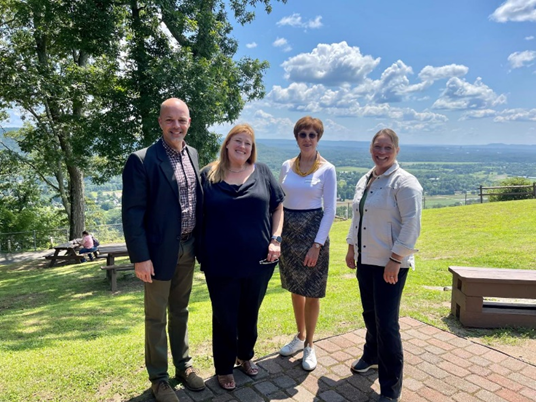
From left to right: Senator Adam Hinds, Representative Susannah Whipps, State Auditor Suzanne Bump, Representative Natalie Blais at Mt. Sugarloaf in Deerfield.
The second report issued in October showed that Western Mass. communities have long suffered from inadequate support to maintain and develop public infrastructure, including roadways, bridges and culverts, municipal buildings, and broadband. The report led Auditor Bump to call for a Rural Rescue Plan to increase funding for the Chapter 90 program to $300 million annually and revise its formula; create a public infrastructure agency; and continue investment in expanding access to broadband internet.
The response to the report has been tremendous, as there has been a groundswell of support from advocacy organizations, policymakers, elected officials and even news outlets who are calling for implementation of our recommendations.
Berkshire Eagle: Our Opinion: Auditor's report flags longtime issue — Western Mass. woes are ignored
Since the 2016 general election, DLM has provided the Secretary of the Commonwealth and the Legislature with documentation on the costs of early voting. For the 2020 state primary and general election the Legislature had expanded the opportunities for early voting and vote-by-mail to encourage safe voter turnout. This expanded capability led to higher costs for local election officials. DLM conducted a cost survey and analysis of allowable costs that received responses from all 351 cities and towns and resulted in a certification of $2.7 million in reimbursements for cities and towns. This amount was net of funds provided to municipalities through the CARES Act and grants from the Center for Tech and Civic Life that helped support election operations during the pandemic. This successful effort required a high degree of coordination between our office, the City and Town Clerks, the Department of Revenue and the Secretary of the Commonwealth.
Additional Resources
- The Rural Rescue Plan
- Study Shows Western Mass. Communities Have Long Suffered from Inadequate Support to Maintain and Develop Public Infrastructure
- Testimony of State Auditor Suzanne M. Bump on use of Federal Pandemic Relief
- PILOT Programs Undermined by Lack of Funding and Tax Rulings, Report Finds
- During Tour of State-owned Land in Western Mass., Auditor Bump, Local Officials Call on State to Make PILOT Program More Equitable
Protecting Children & Families
More than any other issue, child and family welfare has been a consistent priority of the OSA’s work since 2011.
In June, the OSA issued an audit that called on MassHealth to enhance measures to prevent individuals and families from incurring unnecessary financial hardship during its estate recovery process, which is used to recoup funds from the deceased for Medicaid expenses paid on their behalf. The audit showed that although MassHealth allows waivers to exempt possessions and holdings from the recoupment process, only a small number of members’ survivors petition for them, and even fewer are approved. In response to the audit findings, MassHealth reported it has expanded its criteria for undue hardship waivers, has streamlined the waiver process and created new waiver request forms, which are available online. The agency estimates that these expanded waivers will return approximately $17,200,000 to Massachusetts families each year.
In June, the OSA also issued audits of the Department of Developmental Services (DDS) and the Disabled Persons Protection Commission (DPPC), both of which had significant findings. The audit of DDS provided recommendations to improve the safety and care for individuals with disabilities throughout the Commonwealth. The audit found that DDS was missing timeframes in abuse investigations for follow-up protective planning for alleged victims of mistreatment, as well as for oversight of incident reports from group homes. In addition, the audit showed DDS was not properly monitoring medication reporting for clients. In its response to the audit, DDS stated that it will collaborate with DPPC on it can expedite the investigation process to meet the required timelines to ensure clients with disabilities are as safe as possible. The audit of DPPC showed that it had been missing required deadlines for abuse investigations.
Similarly, this year the OSA completed an audit of the Berkshire County Arc, Inc (BCArc), a nonprofit organization located in Pittsfield, MA, that serves children and adults with intellectual and developmental disabilities, and individuals who need assistance with daily living. The audit identified $777,844 in improper spending, including expenses made on 48 credit cards that were unallowable under state regulations. The audit offered the human service provider recommendations to address these issues.
In continuation of her support of electronic backpack legislation, Auditor Bump in December offered testimony outlining the need for this tool to support the educational career of children in foster care. This backpack would contain digital copies of relevant electronic records for the student, including past academic performance and information about past educational providers.
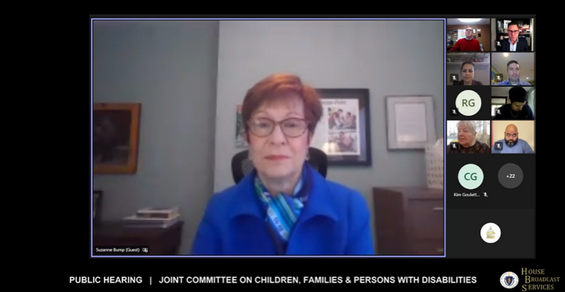
Auditor Bump delivering testimony before the Joint Committee on Children, Families and Persons with Disabilities in support of H.236, An Act Creating an Electronic Backpack for Foster Children.
A report released by the OSA in 2019 examined the challenges schools face in meeting the educational needs of students in foster care. It noted that schools expend significant time and effort ensuring children in foster care receive the right educational services and called for the creation of an electronic backpack program to address this problem.
Additional Resources
- Testimony of State Auditor Suzanne M. Bump in Support of Electronic Backpack Legislation
- Audit Calls on MassHealth to Enhance Measures to Prevent Unnecessary Financial Hardship in its Estate Recovery Process
- Auditor Bump Calls for Improvements to State’s System Providing Educational Services to Children in Foster Care
Making MassHealth Efficient & Accountable
MassHealth is the largest state government program in the Commonwealth, as it provides access to healthcare services for approximately 1.8 million eligible low- and moderate-income children, families, seniors, and people with disabilities annually. In fiscal year 2019, MassHealth paid healthcare providers more than $16 billion, of which approximately 50% was funded by the Commonwealth. Medicaid expenditures represent approximately 39% of the Commonwealth’s total annual budget.
Due to MassHealth’s size and complexity, the OSA has established a dedicated Medicaid Audit Unit to perform oversight of this program. In 2021, the OSA released an audit of claims for hospice-related services paid by MassHealth for dual-eligible members (members who are enrolled in both the federal Medicare program and the state’s Medicaid program). The audit found significant problems with MassHealth’s administration of this program. Specifically, MassHealth did not ensure that it had accurate information about dual-eligible members in its system and was not ensuring that hospice providers were effectively coordinating all hospice-related services. As a result, MassHealth may have paid millions of dollars in claims that should have been paid for by the federal Medicare program.
Total Payments Made to Non-Hospice Providers
|
Calendar Year |
Total Payments |
Members Served |
|
2015 |
$ 119,637,456 |
15,357 |
|
2016 |
138,667,368 |
16,383 |
|
2017 |
159,053,107 |
17,691 |
|
2018 |
174,539,941 |
17,822 |
|
2019* |
28,686,299 |
6,370 |
|
Total |
$ 620,584,171 |
38,568† |
* This row includes claims submitted from January 1, 2019 through July 31, 2019 that have been paid. Because of the timing of payments, it does not include claims submitted during that period that have not been paid.
† This number represents the unduplicated member count over the entire audit period.
This audit was made possible as a result of a collaboration with the U.S. Department of Health and Human Services (HHS) Office of Inspector General’s (OIG) Boston office. Together, the OSA and the HHS OIG detailed this successful partnership several times throughout the year at local and national conferences, including at the Association of Government Accountants (AGA) Professional Development conference in July 2021.
Additional Resources
Improving Public Benefit Fraud Investigations
One of the core functions of the OSA is investigating fraud in public benefit programs, such as MassHealth and the Supplemental Nutrition Assistance Program (SNAP). This work is done by the OSA’s Bureau of Special Investigations (BSI).
During the spring of this year, BSI hired the largest class of new hires in recent years to assist with this work, bringing on four new examiners: Central Processing Unit Fraud Examiner, DAU Fraud Examiner and two Fraud Examiners for the Super Fraud Unit.
“One of the core functions of the OSA is investigating fraud in public benefit programs, such as MassHealth and the Supplemental Nutrition Assistance Program (SNAP). This work is done by the OSA’s Bureau of Special Investigations (BSI). ”
In addition to handling its usual public benefit fraud investigations over the course of this year, BSI acquired a new CMS from OpenText and implemented a new case management system, the BSI CMS. This new system includes new data entry features that enhance the workflow of the unit, allowing for documentary evidence to be uploaded electronically. This project was completed while working remotely, connecting BSI with the teams and tools to conceptualize, configure, implement and train the new system. As BSI continued its work over the course of a period when remote work was the standard, importantly, BSI worked to transition the sharing of information with some of our information providers to electronic formats. Specifically this was the case with the Department of Revenue (DOR), which provides wage and tax information for BSI investigations. The ability for BSI to access records and information vital to its work, so these technological advancements have gone a long way towards helping this unit meet its mission.
This year, BSI also resumed conducting interviews and civil recoveries, which were temporarily paused during the early months of the COVID-19 pandemic. Being able to schedule interviews remotely has allowed BSI to focus on its usual investigatory practices, which is critical to maintaining credibility.
Prioritizing Cybersecurity
As an agency that hosts a wealth of personally identifiable information from numerous state agencies, it is imperative that we prioritize cybersecurity awareness and training to keep this information safeguarded. To that end, OSA has published a webpage solely focused on protecting government from cyberattacks and cyber deficiencies. The page provides important lessons from the audits of other organizations about how we can all better protect ourselves from these threats including:
At the same time, some of our audit work has shown that not all state agencies put the same priority on the issue, putting their own data at risk. This year, the OSA reviewed cybersecurity practices at the Office of the Inspector General, Office of the Attorney General and Division of Banks. While the findings varied by audit, overall it is important to note that the data we keep as state entities is vitally important to protect and the trainings intended to equip staff with the tools and knowledge they need to be active participants in this effort is critical.
In an effort to be an active participant herself, this year, Auditor Bump recorded a video with the Comptroller’s Office where she shared five cyber tips as part of their video series “CTR Cyber 5,” which aims to raise awareness about ways to improve cybersecurity internal controls. The video can be found here.
Additional Resources
Holding State Government Accountable
As a fundamental pillar of the OSA’s mission, there are a number of ways that we have held state government accountable over the past year.
In March, the OSA found that the Department of Industrial Accidents (DIA), which is responsible for reviewing workers’ compensation disputes had not met the required timeframes for completing cases. The audit determined that 68% of cases processed by DIA were not completed in the mandated timeframes for initial case conference, hearing, and decision.
In June, the OSA released an audit of the State 911 Department, which found that it did not effectively promote and educate the public about the statewide 911 emergency call system’s silent call feature. This feature is used to communicate with individuals who are not able to speak because they are deaf or hard of hearing, or for other reasons such as experiencing a medical emergency, or if it’s unsafe to speak.
In November, the OSA found that the Transportation Network Company Division of the Department of Public Utilities (DPU) did not follow its own regulations in its oversight of transportation network companies (TNCs) in Massachusetts. Specifically, the Division did not ensure that TNCs were ensuring the safety of their riders by conducting background checks, imposing sanctions against drivers with suspended or revoked permissions, and investigating and resolving complaints. According to the Transportation Network Division’s website, there were approximately 64.8 million rideshare trips that went through TNCs’ digital networks in Massachusetts during calendar year 2017 and approximately 81.3 million rideshare trips during calendar year 2018.
State House News Service: Audit faults state oversight of rideshare drivers
Over the course of the year, the also reviewed the retirement benefits available to eligible state retirees, including those of the Massachusetts Teachers’ Retirement System (MTRS) and the Massachusetts State Retirement Board (MSRB). The MTRS audit revealed that nearly 25 percent of newly retired educators did not receive their first monthly benefit payments within the mandated timeframe, and the MSRB audit found that 97% of all new retirees did not receive their first payments within the mandated timeframe.
Additional Resources
- Audit Reveals 68 Percent of Workers’ Compensation Cases Delayed by Department of Industrial Accidents
- Audit Finds Lapses in Department of Public Utilities’ Oversight of Transportation Network Companies
- Enhanced Education and Promotion of Silent Call Feature Needed in State 911 System, Audit Shows
- Audit Shows 25 Percent of Newly Retired Massachusetts Educators Received Delayed Retirement Benefit Payments
